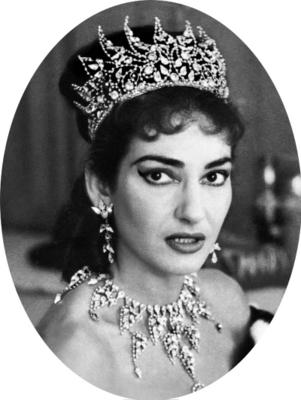Callas's Jewels
 How close can a Callas fan really get to the great diva these days? I'm sure plenty of people (myself included) would be willing to look at the costume jewelry she wore on stage during her most important performances. Just such an exhibit is on view right now at the Galerie der Stadt in Salzburg, as I learned from an article (Les bijoux de la Callas, August 20) by Jean-Louis Validire for Le Figaro (my translation):
How close can a Callas fan really get to the great diva these days? I'm sure plenty of people (myself included) would be willing to look at the costume jewelry she wore on stage during her most important performances. Just such an exhibit is on view right now at the Galerie der Stadt in Salzburg, as I learned from an article (Les bijoux de la Callas, August 20) by Jean-Louis Validire for Le Figaro (my translation):
Here is the jewelry that Callas wore during her debut in the Arena di Verona, on August 2, 1947, in La Gioconda. It was also the debut of her supposed rivalry, invented by the press, with Renata Tebaldi. The latter, protégée of Toscanini, who had discovered her, was supposed to open the Verona season, but because of a storm the performance had been cancelled and it was Maria Callas who first received the honors of the press. [...] The immense popular success caused the delighted singer to ask to meet the jeweler who had made such beautiful jewels, to ask him "if they were valuable."The collection of jewelry would have disappeared because Marangoni went out of business. The Swarovski company decided not to destroy them and instead organized the exhibit, which will travel to the places where Callas made her name. After Salzburg (closing on August 31), Maria Callas and the Swarovski Jewels will travel to Covent Garden in London (opening on September 13), New York (for the 50th anniversary of Callas's New York premiere as Tosca), and Paris (it has apparently already been on display in Verona and Vienna). I cannot locate a Web site for the Salzburg museum, but there will hopefully be a Web site for the exhibit at one of its future locations.
The jewels had been created by Ennio Marangoni in Milan, according to a process invented in Bohemia by Daniel Swarovski, who had revolutionized the size of crystal stones. Marangoni's workshop in Milan had become the leader in stage jewelry for movie and opera stars. Marilyn Monroe and, more recently, Nicole Kidman (in the film Moulin Rouge) have worn these pieces of jewelry, each of which required between 50 and 70 hours of work. [...] The exhibit, which covers the period between 1946 and 1960, gives a very precise idea of the evolution of scenographic esthetics by presenting, alongside each jewel, a photo of La Callas in the role, the original poster of the premiere performance, and an explanatory note giving the context of the production, including some anecdotes.





















































No comments:
Post a Comment